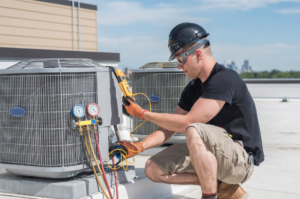 A career in Heating, Ventilation, and Air Conditioning (HVAC) is a dynamic and essential field that ensures functions of indoor climate control systems. HVAC professionals play a crucial role in providing comfortable and healthy environments in homes, offices, industrial spaces, and more.
A career in Heating, Ventilation, and Air Conditioning (HVAC) is a dynamic and essential field that ensures functions of indoor climate control systems. HVAC professionals play a crucial role in providing comfortable and healthy environments in homes, offices, industrial spaces, and more.
At its core, HVAC involves the installation, maintenance, and repair of heating, ventilation, and air conditioning systems. These systems are responsible for regulating temperature, humidity, and air quality within a space, ensuring optimal comfort and well-being for occupants.
Roles in HVAC:
- Installation Technician: These professionals are responsible for setting up HVAC systems in new constructions or during renovations. This includes positioning units, connecting ductwork, and configuring control systems to ensure proper functionality.
- Maintenance Technician: Maintenance technicians perform routine check-ups, inspections, and necessary repairs on HVAC systems. They also handle tasks like cleaning, lubricating, and replacing parts to ensure systems operate efficiently.
- Service Technician: When HVAC systems break down or experience malfunctions, service technicians are called in to diagnose and fix the issues. They possess the expertise to troubleshoot problems and implement effective solutions.
- Design and Sales Professionals: Some individuals in the HVAC industry focus on system design and sales. They work closely with clients to assess their needs, recommend suitable systems, and design layouts that maximize energy efficiency and comfort.
Key Skills and Qualities:
A successful HVAC professional should possess a combination of technical skills and personal qualities, including:
- Technical Proficiency: Understanding the intricacies of HVAC systems, including electrical components, refrigeration cycles, and airflow dynamics, is fundamental.
- Problem-Solving Abilities: HVAC technicians must be adept at diagnosing and solving issues efficiently, often in time-sensitive situations.
- Attention to Detail: Precision is crucial when installing or repairing HVAC systems, as even minor errors can lead to inefficiencies or malfunctions.
- Customer Service Skills: Effective communication and a customer-centric approach are important for understanding and meeting clients’ needs.
- Adaptability: Given the diverse nature of HVAC work, technicians must be adaptable to different environments, equipment, and technologies.
Whether you’re drawn to designing cutting-edge systems, troubleshooting complex issues, or ensuring proper maintenance, the HVAC industry provides a fulfilling and stable career path. With the increasing push on energy efficiency and indoor air quality, HVAC professionals are at the forefront of creating comfortable, healthy, and sustainable living and working spaces
 Education is key. Career and Technical schools around Pennsylvania provide programs to train the professionals of tomorrow. The Pennsylvania Builders Association’s Endorsed Trade Program works with these programs to make sure students are prepared for the workforce. To learn more about the ETP and where to find an approved program near you, CLICK HERE.
Education is key. Career and Technical schools around Pennsylvania provide programs to train the professionals of tomorrow. The Pennsylvania Builders Association’s Endorsed Trade Program works with these programs to make sure students are prepared for the workforce. To learn more about the ETP and where to find an approved program near you, CLICK HERE.
Learn about more career opportunities and how much you can earn HERE.